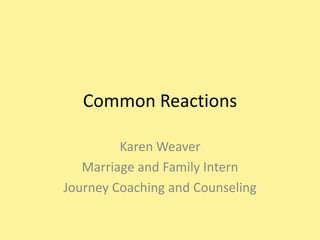
Behind the Scenes
- 1. Common Reactions Karen Weaver Marriage and Family Intern Journey Coaching and Counseling
- 2. Divorce changes • Short term- living situations, schools, etc • Long term- how children handle adversity, change and relationships • Children can and will adjust well given proper guidance and support
- 3. Understand and Help This presentation will help you to: • Understand what your child can process developmentally • Learn ways to help your child express their feelings • Be competent at helping your child adjust to these changes • Develop a closer bond with your child
- 4. What did you feel about divorce? Angry, sad, lonely, confused, depressed, worried, overwhelmed, relieved, guilty?
- 5. How did you cope? Talking with friends, crying, shopping, planning, moving, traveling,
- 6. withdrawal rage Anger Spectrum
- 7. Toddlers Developmentally toddlers: • Do not understand cause and effect. • Have difficulty expressing themselves verbally. • Express emotions behaviorally. • Cannot understand permanent or temporary.
- 8. Toddlers Common reactions: • Express feelings behaviorally. • Often regress in behaviors. • Demonstrate more anger.
- 9. Toddlers What you can do: • Help them express their feelings (labeling). • Validate their feelings. • Provide reassurance, love and closeness. • Play games that connect.
- 10. Preschoolers Developmentally: • Feel they are the center of the universe. • Start to understand cause and effect. • Seek to differentiate themselves. • Crave independence, still need and want limits.
- 11. Preschoolers Common reactions: • Demonstrate regressive behaviors. • Become clingy and insecure. • Act super good. • Feel insecure you may leave them also. • Act out in angry ways more frequently.
- 12. Preschoolers What you can do: • Label and voice their feelings for them. • Provide reassurance, closeness. • Reassure them it’s not their fault. • Validate their feelings. • Help them find a “feel better” strategy/item.
- 13. Kids 6-8 years old Developmentally: • Have more reasoning skills. • Able to voice feelings more effectively. • Understand you won’t leave them. • Building more coping skills.
- 14. Kids 6-8 years old Common reactions: • Feel guilty, maybe their fault. • Have a strong desire for parents to reunite. • Hide or deny feelings. • Attribute feelings to siblings or friends. • Act super good.
- 15. Kids 6-8 years old What you can do: • Validate their feelings. • Provide reassurance, closeness, cuddles. • Answer honestly about getting back together. • Watch your emotional reactions. • Don’t bad mouth the other parent. • Help them find feel better strategies.
- 16. Tweens – ages 9-12 Developmentally: • Crave independence, still want emotional guidance and support. • Have more reasoning abilities. • Still have difficulty with ambiguous and complex situations.
- 17. Tweens Common reactions: • Start blaming one parent. • Demonstrate more anger. • Can be inclined to distance themselves. • Want parents to reunited.
- 18. Tweens What you can do: • Prompt discussions “I wonder if …” • Validate their feelings. • Encourage appropriate expression of anger. • Don’t encourage anger at the other parent – encourage time together. • Problem solve with them.
- 19. Teenagers Developmentally: • More adept at coping and reasoning. • Desire more independence. • Hold rigid beliefs, thoughts. • Believe they have control over environment – one parent failed.
- 20. Teenagers Common reactions: • Possibly blames one parent. • Growing up too fast (parentification). • Recognize feelings of others. • Withdrawal.
- 21. Teenagers What you can do: • Keep open communication. • Encourage them to spend time with peers. • Spend time with each parent. • Keep them involved with the family. • Problem solve with them.
- 22. Warning Signs • Frequent angry, violent outbursts, • School behavior problems, trouble with grades • Withdrawing from friends, family, isolating • Cutting, drug or alcohol abuse, self injury, extreme risk taking • Disinterest in previous enjoyable activities.
- 24. Thank You! • Please complete the survey • Contact me for a free phone consultation • Sign up for my enewsletter